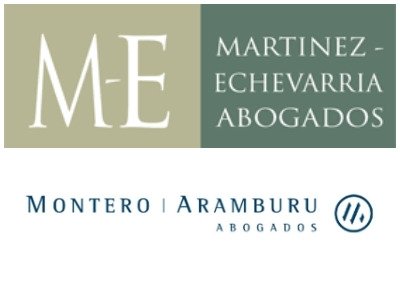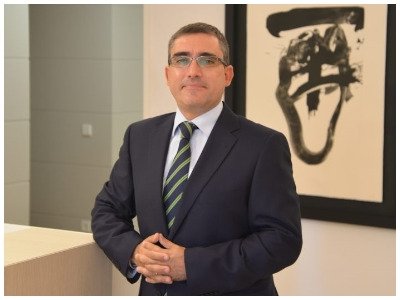Pablo Villodres, when talent meets commitment

Pablo, who turned 23 in March, defines himself as a fairly normal kid, who likes to constantly challenge himself and get over it. He considers himself a responsible and committed person who puts the maximum effort and work into everything he does. He confesses that he is enthusiastic about learning from the areas he is passionate about and says that he receives criticism well, as a form of feedback to improve. Last August 4, an important national media interviewed him because of the exceptional nature of his case: he had obtained 39 honorary degrees in his double degree in Law and Finance and Accounting from the University of Seville. Iberian Lawyer learned about this young talent whose name -we are now predicting- must be remembered.
When we speak with Pablo (pictured), he tells us that he has just finished his internship in the Corporate Law and M&A department of Garrigues Seville office.
39-40 subjects with honours in a double major of Law and Finance and Accounting is quite impressive. It’s easier said than done, but it can’t have been easy. What was your method of study? How did you get organised?
More than studying every day, an essential factor in achieving the results obtained has been the fact of having attended class. I think that’s where a good part of what I’ve accomplished lies: in addition to being able to understand the subjects from a more practical point of view and having very interesting and enriching debates on legal issues, I’ve had the opportunity to meet and learn from experts of recognised prestige in their field, many of them top-level officials (Judges, Prosecutors, Lawyers from the Administration of Justice or State Attorneys, among others).
Regarding the second question, I have not followed any specific study method (e.g. studying every day or studying a specific number of hours per week). I think it has mainly been a matter of good planning based on the importance that each subject could entail as well as trying to be as efficient as possible in the gaps I had to study. Obviously, going to class and being attentive to the explanations has really helped in this regard.
For sure, you have always been a good student. Where did they teach you to study, at school, high school or at home?
I don’t think anyone taught me to study as such. Like many things in life, I believe it is the result of a long process of individual development based on “trial and error” in which you try to learn from the mistakes you make. However, it is true that during these years there are specific people who, in one way or another, mark you. From my grandmother (who at the age of 4 had already taught me to read), to my mother (who instilled in me the importance of studying by relying on my memory) and finally my father (from whom I learned to be a resilient person).
Why did you choose that double major specifically?
Unlike the tradition in my family of studying health-related careers (basically medicine and pharmacy), I was always interested in career opportunities in the area of finance (e.g. investment banking or stock market). With this in mind, and with the good advice of family friends, I understood that the possibility of complementing these studies with a degree in Law would allow me to have a holistic profile, which is highly valued in the professional field.
You must have also had good teachers. How do you rate the public university education, specifically in the area you have studied?
Having done all my schooling in a private institution, I have realised that what is relevant about an educational entity is not the source of the funds with which it is financed, but the quality of the teaching staff. It is true that at the beginning I had doubts about what the change would be like, but I have to say that, in my case, any preconceived idea disappeared immediately: the student/teacher ratio has been practically the same (at some times of the year, we went as low as 5 people to class) and have been, without exception, very comprehensive to any problem someone had.
Compared with colleagues who have studied at a private university, if I had to point out any limitation, it would be the greatest difficulty in gaining access to internships in specific areas at some international institutions. On the other hand, it is also logical, bearing in mind that, for administrative purposes, one cannot compare a university with 70,000 registered students (such as the University of Seville) with one that is smaller, where obviously the career guidance service can be much more personalised.
You have recently completed your internship in one of the most renowned firms in our country, as is Garrigues. How has the experience been? What has been the best advice you have received so far?
I can only say positive things about my experience at Garrigues. My colleagues there stand out not only for their professional capacity but also for their human quality. In this sense, I felt integrated with the team from the first day and they have been able to enhance many of my personal aspects very well. Of course, this is a place I would recommend to anyone who is considering joining an organisation where the learning curve is endless.
From the lessons learned, I would stress the importance of addressing adaptation to change, not as something negative, but quite the opposite, as a source of opportunity. At a time like the present when the reality is very liquid, having this philosophy is vital in any area of life and when facing any challenge, even more now in a context of global uncertainty.
What are your reasons for being “the best” in so many subjects? What would you say to those who underestimate academic results compared to other “assets” such as work experience?
I’ve always been very aware of the importance it has to try to do your best. Indeed, the honours I’ve achieved have been no more than the result of that. At no time did I set myself the goal of reaching a specific number of them, but it is true that a certain point, I challenged myself to try to improve in this aspect. Thus, up to the point of achieving 39.
I think that the constant debate between the variables you point out cannot be approached from a dichotomous perspective: one thing is as important as the other. In my case, the internship I did in Garrigues helped me understand, from other points of view, concepts that I had previously studied at University, as well as to develop in great depth, aspects such as soft skills. In fact, with perspective, if I could go back, I would have tried to apply to internships during each and every one of these last 5 years.
Your final year project focuses on one of the most important issues at the moment: the energy sector. Explain us briefly what it has consisted of and why you chose this subject.
My final year project is focused on “Power Purchase Agreements” (PPAs), and with it, I have tried to offer both a legal and financial approach to this long-term “green” electricity supply agreement. This topic was proposed by my tutor, Mr Juan Ignacio Contreras Mora, and from the moment he had the opportunity to tell me about it, I found it enormously interesting because of its novelty, the advantages it offers and the future projection it will have: in the last decade their use in terms of contracted volume has grown exponentially, to the point that only in 2019 corporate PPAs have reached 19.5 GW (Bloomberg NEF, 2019).
Although at present this figure is predominant on the American continent, the increase in the efficiency of the renewable energy generation plants and the geographical/climatological factors presented by Spain will lead to a boom of this figure in our country in the coming years. To these circumstances, we must add the enormous promotion of the use of renewable energies from different spheres, such as the Directive 2018/2001.
Likewise, at the state level, solutions are beginning to be sought to the main barriers that may limit the conclusion of these contracts. An example of this is the draft of the Royal Decree regulating the Statute of Electro-intensive Consumers, which envisages the possibility of the State covering the insolvency risk of consumers who fall within the scope of that regulation, provided that they make use of a PPA. This mitigates what may be the most relevant risk of a PPP, namely credit risk.
On a personal level, we imagine that your family will be very proud. Tell us about the reception of your grades, on the one hand, in your most intimate core and, on the other hand, among acquaintances and relatives.
Although it is something they already expected, in general, they are very satisfied with the recognition of certain values that such an achievement implies, such as responsibility, effort and commitment. Like me, they have also been surprised by the enormous impact of the news article published by ABC. Of course, all my acquaintances and family members have congratulated me, but it has also been done by people I did not know at all, even inviting me to participate in selection processes of the companies to which they belong.
How is Pablo like when he doesn’t study? What are your hobbies or interests?
I consider myself a very proactive person; I’m always involved in carrying out various projects at a time. Additionally, I’m a person who likes to do sports a lot, and to a certain extent, I attribute my good performance in the academic field to this. During these years, I have had the opportunity to practice paddle tennis, canoeing or Crossfit. Contrary to what one might think, I recommend that anyone who is ready to start a career should try to combine sports with their studies: in my opinion, it helps you at certain times to let off steam and, with planning, there is time for everything.
Finally, what are your next challenge-plans? Where would you like to work in the future, as part of a firm, your own office or in-house?
Before deciding on any of the different professional opportunities that my career offers, I would like to be able to do an internship in the field of Consulting or Investment Banking.
This would provide me with the necessary insights in order to analyse whether my career path would best fit, either in one field or the other, and consequently evaluate more precisely where I could contribute more as a professional.
If I finally decide to go into Law, in the short and medium-term, I would say that I do not see myself anywhere else but in a law firm. I love working in a team, and I also believe that it is the best way to learn and grow professionally.
Interview by desiré vidal
To read the interview in full please download issue N.97 here












